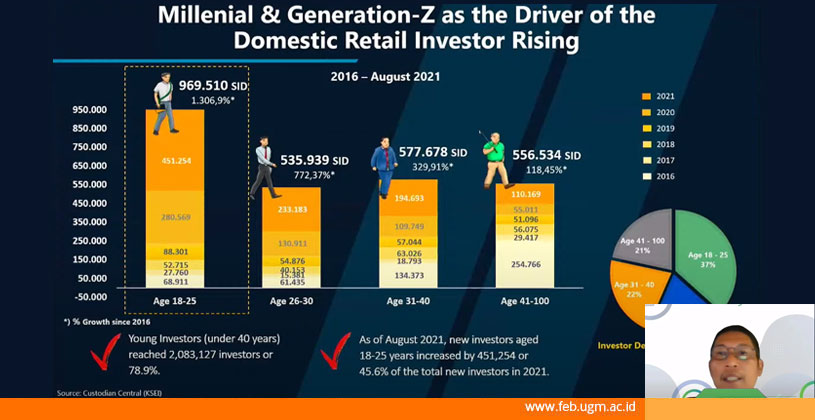Millennial Generation, the Main Factor Increasing Retail Investors in the Capital Market
- Details
- Written by Sony
- Category: News
- Hits: 5593

Responding to the momentum of increasing retail investors in the Indonesian capital market, on Wednesday (10/13/2021) the Alumni Family of the Faculty of Economics and Business, Universitas Gadjah Mada (KAFEGAMA) held a Webinar Series with the main theme "Utilizing the Momentum of Rising Retail Investors in the Indonesian Capital Market: Opportunities, Challenges, and Policies". The webinar, which was held on the Zoom platform and via the KAFEGAMA Youtube channel, was moderated by Eddi Danusaputro, President Director of PT. Mandiri Capital Indonesia, Deputy Head of Division IV PP KAFEGAMA.
Discussing opportunities, challenges, and appropriate policies to take advantage of the increase in retail investors, this Webinar was attended by resource persons, namely Dr. Perry Warjiyo as Governor of Bank Indonesia and General Chairperson of PP KAFEGAMA, Minister of Finance of the Republic of Indonesia Sri Mulyani, M.Sc., Ph.D., Inarno Djajadi as President Director of the Indonesia Stock Exchange, Dr. Frederica Widyasari Dewi as President Director of PT BRI Danareksa Sekuritas, and Prof. Dr. Eduardus Tandelilin, MBA. , Head of the Master of Management Study Program FEB UGM, Jakarta Campus.
The first session was the opening speech from Dr. Perry Warjiyo. Dr. Perry said that we Indonesians have gone through 18 months of living with a pandemic, for that he suggested that people need to have the spirit to rise, be healthy, and optimistic, as the spirit of KAFEGAMA is to be friendly, harmonious, and migunani.
"With Guyub we unite to work together to help each other, through Rukun(Harmonious) we seek the best to become one strength, and the spirit of Migunani is the strength to rise up and be optimistic," he said.
Dr. Perry also discussed Indonesia's economic growth in 2021.
"After experiencing a high growth of 7.07 percent, Insya Allah, it will continue to grow in the third and fourth quarters, and this year's total will grow 3.5-4%. For this reason, our economy is predicted to continue to rise and we need large, medium and small investors, and this condition is an opportunity to invest.” he explained.
The second session was a presentation from Inarno Djajadi regarding the development of retail investors in the Indonesian capital market.
Inarno explained using a graph that the total investors as of September 2021 were 6,431, stock investors were 2.9 million investors, and from stock investors there was an increase of 7.2%. According to him, this achievement cannot be separated from the influence of social media influencers.
"We also see that the role of influencers is very influential on retail investors, influencers can really influence retail investors, especially through social media, this is a changing era that we see during a pandemic, retail investors can look at stock developments and transact better," he explained. .
He explained that retail transactions after the mobility restriction policies (PSBB and PPKM) moved people to do something from physical to online, for that people who were active at home were given the opportunity to view stocks and invest in stocks longer than before the pandemic. It is proven that before Covid-19 retail transactions were only 31%, but currently our retail transactions are 55%, even retail dominates domestic and foreign institutions.
According to him, the most retail investors are young investors (aged 40 years and under) with 2,083 million investors or 78.9% of the number of stock investors.
“So, indeed, the millennial generation or young investors dominate and the growth is very fast compared to other investors. As of August 2021, 18 until 25 years old investor, up 450 thousand or 45.6% of the total new investors in 2021, right now is the rise of young investors or millennials who dominate transactions on the stock exchange," he concluded.
The next session was the presentation of Dr. Friderica Widyasari Dewi. Dr. Friderica discussed the challenges and strategies for developing the retail market in Indonesia. According to her, the challenges of developing the retail market include the lack of public understanding of investment in the capital market, lack of human resources to market the capital market, various business processes that are still inefficient, limited supporting infrastructure, limited alternative product options in the capital market, and investment illegal.
"The development strategy needed is a system that can improve user experience, increase capital market literacy and education, increase digital and growth mindset for HR, build a digital culture and manage digital assets, protect investors and collaboration between all parties starting from regulators, investors, issuers, intermediaries, and the public.”. she explained.
The session continued with a presentation from Prof. Dr. Eduardus Tandelilin on the role and behavior of retail investors. Prof. Ted said that there are two important things to consider, namely value and price.
“Price is real, we know today's stock price, but we don't know what the value (correctly) is, the market price is the investor's perception of risk. For that we have to ask about intrinsic value,” he explained.
Prof. Ted explained about fundamental analysis, starting from asking questions about what assumptions are used to determine growth and rate of return, what are the prospects for stocks and types of industries, as well as determining profitable stocks in the current economic conditions.
"Fundamental analysis is needed starting from macroeconomics to industry, to determine value and market price, to determine whether the stock is undervalued or overvalued," he explained.
For a strategy to increase retail investors, Prof. Ted explained that it was necessary to increase investor trust in the capital market through governance, floating stock to make it easier for retailers to buy, and also a strategy on how retail investors could reach IPOs early.
Then the session continued with a question and answer session and a closing session, namely a group photo as a marker for the end of the webinar session.
Reportage: Sony Budiarso/Kirana Lalita Pristy


